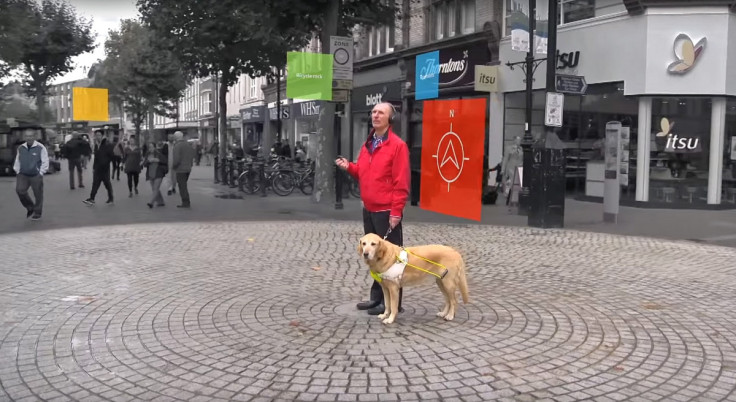Microsoft Cities Unlocked: High-tech headset helps the blind navigate cities unaided

Microsoft has updated its state-of-the-art navigational headset for the blind so that it now has the power to process voice commands and to replay audio instructions or directions given by passers-by.
The Cities Unlocked project is a collaboration between Microsoft and the Guide Dogs charity, to develop a headset that enables people living with sight loss to navigate unaided. The headset technology is known as 3D Soundscape – it contains a GPS tracker, a gyroscope and a compass and bone conduction, which converts sound waves into vibrations that pass straight through your skull, skipping the eardrum to get to your inner ear.
When connected with the person's smartphone, the headset uses bone conduction to signal the person when to turn in order to follow a route plotted on Bing Maps in the smartphone app, while other real-time information and cues are provided verbally using the headset about points of interest.
A test journey to demonstrate the technology saw a woman with sight loss walk to a bus stop in Reading, catch a bus to Reading rail station, navigate the station and catch a train to London Paddington station and navigate from the train carriage all the way to the ticket barrier, while another experiment saw her experience a personalised retail experience at a supermarket.
Microsoft first announced the technology pilot in November 2014 – one year later, the headset has now been updated in Phase Two so that the user can speak into the microphone to state where they want to go, and the headset will process the voice command.
If the user asks for directions, the headset can play the audio information back again for the user, and the user can then issue the correct commands to the headset to alter the route chosen.
Microsoft says that its technology is still only at the conceptual stage, but its initial tests show that people with sight loss who use the technology are able to be autonomous and more competent in engaging with their surroundings.
In future as cities become smarter, Microsoft wants cities to be fitted with Bluetooth beacons on lamp posts and buildings, which can then communicate with the headset to identify more points in the city and prevent the person from knocking into features like bicycle racks.
The results showed that people who tested the headset experienced significantly improved measures of wellbeing, including confidence, spontaneity, reassurance, relaxation, a reduced need for planning journeys and an increased awareness of location and surroundings.
"When you use the device, it does paint a picture of the town. It told me all the different shops, but it also told me all the names of the streets and also the compass direction," said Gerald James, who has been trialling the technology. "I just think it gives you a greater freedom really, and more independence."
© Copyright IBTimes 2025. All rights reserved.






















